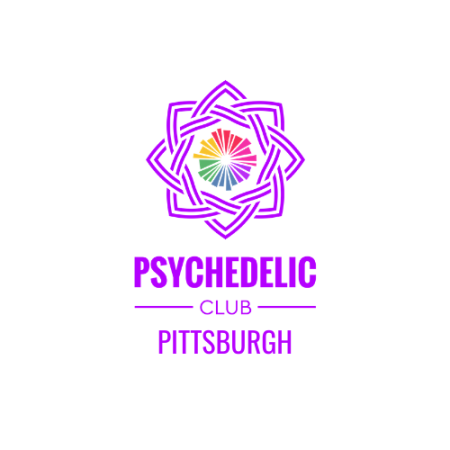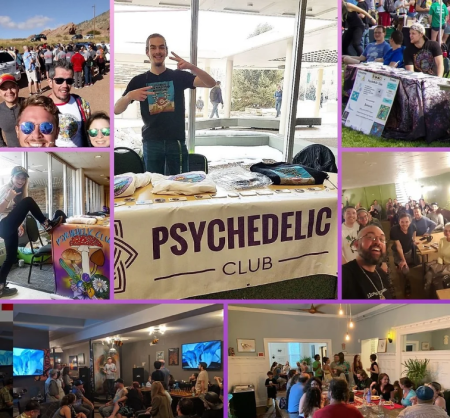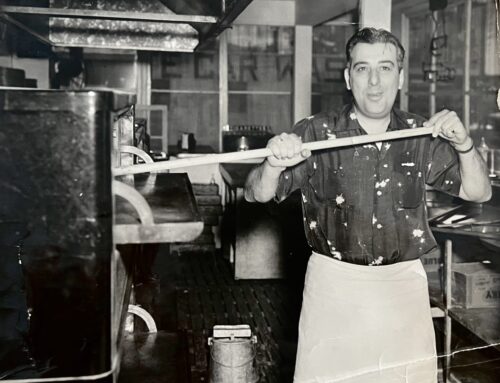The Psychedelic Club of Pittsburgh is an open-to-all monthly discussion group geared as a free-form way for anyone with an interest in psychedelic substances to trade experiences, tips and tricks.
By James Paul
The following article was produced for republication with the assistance of the Pittsburgh Media Partnership.

The logo for the Psychedelic Club of Pittsburgh, image courtesy Gregory Paustenbach.
Soft light poured out the windows of an old bricklayer’s mansion turned event space in Wilkinsburg. Inside, roughly 20 people sat around two dining room tables, guarded by a maze of brightly colored halls and side rooms filled with plants and sculptures.
The attendees passed around a mushroom risotto over heaping plates of turkey, stuffing and other Thanksgiving hallmarks. Over fast-emptying bottles of wine, conversations between old friends and new connections flowed.
One man, gently bouncing on his heels to soothe his 10-month-old son strapped to his chest, talked about proper ketamine dosing. Another shared how he first did LSD in the 1960s at the height of Jimi Hendrix’s fame.
This was the scene at the Nov. 18 Friendsgiving dinner of the Psychedelic Club of Pittsburgh, an open-to-all discussion group for the psychedelically curious and inclined.
The Psychedelic Club of Pittsburgh was founded in 2019 and holds a general meeting once a month at a rotation of cafes and other venues that agree to host. The meetings are open to all, charge no admission to attend and foster free-form conversations about everything from psychedelic experiences to safe means of consumption. They also serve as an unofficial legislative breeding ground for those with an interest in deregulating psychedelic substances to meet and discuss initiatives.
Gregory Paustenbach, the president of the club, said its purpose is to provide a “safe place for individuals to talk about everything psychedelic.” He said the club strictly prohibits soliciting substances at meetings and doesn’t even directly condone psychedelic substance consumption.
“But what you do outside of those meetings is entirely up to you,” Paustenbach said.
Beyond the monthly meetings, the club also partners with Pittsburgh area organizations like Prevention Point to teach “harm reduction 101,” such as Narcan training and the use of fentanyl test strips, Paustenbach said. Further, the club hosts integration meetings to discuss how realizations garnered from psychedelic experiences can be infused with one’s day-to-day, he said.
Paustenbach joined the club soon after its founding in 2019. He said he came to psychedelics like many others: 16 years old and wanting to experiment. Around that time and without guidance, he took MDMA, LSD and some mescaline tablets that were “going around.”
“There was no real understanding between this substance and that substance,” Paustenbach said. “So it was just kind of all out there at once. And fast forward to today, there’s still really not much more understanding about these substances.”
Between then and when he revisited psychedelics in his 30s, Paustenbach said he worked at UPMC Western Psychiatric Hospital for 11 years in various positions including as a therapist, evaluator clinician and discharge specialist. Now, he said he wants to couple his institutional knowledge with what he’s personally discovered through psychedelic substance use to educate the community through the club.
“I kind of bring my knowledge to the community,” Paustenbach said. “And the Psychedelic Club is just kind of like a launching pad for people to come together to learn.”

The Psychedelic Club of Pittsburgh, lower right corner, is one of 35 chapters of the psychedelic club national organization. Chapters span states including Texas, Utah and Tennessee and many more, image courtesy of Joey Gallagher.
Sa’ed Al-Olimat, a founding member of the club and founder of PsiloHealth, an organization that conducts integration workshops, said his involvement with the club started when he founded the Psychedelic Society, another psychedelic club with similar objectives.
The separate groups were established a year apart, and when Al-Olimat was about to enter rotations for pharmacy school where his time would be siphoned, he agreed to merge organizations, he said.
The Psychedelic Club of Pittsburgh attracted a handful of members at the first meeting and then a couple of dozen each month. Al-Olimat said the club now brings in anywhere between 60 and 100 people each session, from the “mycophiles” — fungi enthusiasts — to “dead heads.”
“The spectrum of individuals is a spectrum, and there’s no way to generalize what a person is, who a person is, that comes into these club meetings,” Al-Olimat said. “The first person that showed up when I set up the Psychedelic Society meetup was a 65-, 66-year-old social worker who had never taken psychedelics before.”
The Pittsburgh Psychedelic Club is one in a network of 35 chapters of the Psychedelic Club nonprofit, which operates out of Colorado, according to the national organization’s website.
Joey Gallagher, the former president of and current adviser to the executive board of the Psychedelic Club national organization, said the national organization was founded in 2016, and he directly assisted with the establishment of the Pittsburgh chapter in 2019.
Gallagher said as a 501(c)(3), the Psychedelic Club can’t substantially lobby for the deregulation of psychedelic substances. Instead, he said the club was founded on the idea that “social change precedes political change” and that most of the club’s efforts are directed toward the destigmatization of psychedelic substances.
“The Psychedelic Club brings it out in the open, to be like, ‘Hey, it’s OK to use psychedelics. A lot of people have benefited from the substance,'” Gallagher said. “That, in turn, kind of makes it OK to talk about it politically.”
The DEA lists psilocybin mushrooms as a Schedule 1 substance — a category reserved for drugs with no accepted medical use and a high potential for abuse — right alongside heroin.
According to an online psychedelic decriminalization tracker, psilocybin mushrooms are legal in only two states — Oregon and Colorado. Their growth or consumption has reduced penalty statuses in four states. Otherwise, they’re illegal in all states, including Pennsylvania.
Al-Olimat, who is also the current manager of a Penn Hills pharmacy, said he wants Pennsylvania to at least lower the barriers to medical research into psychedelic drugs.
“For me, a clinician, I see the value of opening up research access,” Al-Olimat said. “I think that it’s really about how can we let people know that there’s tremendous potential here therapeutically.”
In 2021, the Pennsylvania Senate shot down House Bill 1959, which would have established a Public Health Benefits of Psilocybin Act to expand the ability for research on the substance, establish an International Review Board to regulate research and instate guidelines for official psilocybin growers.
As for decriminalization, where psychedelic drugs would be the lowest priority of law enforcement, Al-Olimat said, “Any progress is good progress,” and mused that research authorization would lend itself to further deregulation later down the line.
Gina Vensel, a staunch advocate for psychedelics being the lowest priority of law enforcement, said, “This isn’t some free-for-all,” and warned against the reckless and bullheaded use of psychedelic substances. She said if someone is on other medications, they should consult their doctor before exploring the substances further.
“I find myself being kind of like the mama bear of the club,” Vensel said. “Psychedelics are not for everyone. We need to make sure that there’s education before people just see a documentary on Netflix and think that they’re ready to dive in and try these compounds.”
Amongst other ventures, Vensel is also the founder of the Plant Media Project, an organization that focuses on psychedelic education and advocacy. Through her work, Vensel said she is convinced that “we are nowhere close to psychedelics being legalized in any capacity.”
Vensel called the club a “first net” for people who have a fledgling interest in psychedelics and are looking to learn more. She said from there, multiple kinetic groups in the Pittsburgh area are looking to educate the public, reform the legislation and break down access barriers to psychedelic compounds.
“What are we going to do to support the people that are hurting?” Vensel asked. “We’re in a mental health crisis. People are committing suicide at an all-time high. People are overdosing on compounds all the time. We need to do something to protect our community.”
Paustenbach agreed that amidst a nationwide mental health crisis, people are hurting. And beyond lowering the barriers to unproven medications like psychedelics, it’s necessary to confront the persistent stigma surrounding mental health and conventional treatments.
“I think everyone could use the benefits of therapy — that doesn’t mean it has to include a psychedelic component,” Paustenbach said. “You get so far with the substance; you get so far with the therapy. When you do both together, exponentially you’re getting much further.”
James Paul is a journalism student at the University of Pittsburgh and an intern with the Pittsburgh Media Partnership.






